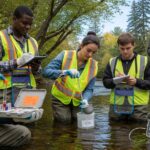West Virginia offers environmental science programs from bachelor's to master's levels at institutions like West Virginia University and Davis & Elkins College. Environmental scientists in West Virginia earn an average annual salary of $80,270 (median $77,980), with the field projected to grow 10.8% through 2032. The state's focus on land reclamation, water quality improvement, and sustainable forestry creates diverse career opportunities across public agencies, nonprofits, and private industry.
Ancient caverns, whitewater rapids, lush forests, and truly spectacular views courtesy of the New River Gorge are just a few of the natural features that make West Virginia's environment unmatched. But if you've lived in West Virginia, you've likely learned about this state's challenging environmental past-when overzealous logging stripped the land and created a vulnerable landscape prone to wildfires, when pig iron smelting filled the air with toxic smoke, and when acid drainage from unreclaimed strip mines poisoned waterways.
The last 50 years have brought significant change to the Mountain State, returning much of its waterways, forests, and farmland to their previous glory. New laws at both the national and state levels cleaned up abandoned mine waste, reduced toxic emissions, protected endangered species, and improved land use practices. In 2018, the West Virginia Department of Environmental Protection announced a $50 million plan to improve the state's water quality.
West Virginia's efforts toward sustainability are greater than ever, and there's still important work ahead. If you're considering an environmental science degree, West Virginia offers programs that connect you directly to this state's ongoing environmental transformation.
Environmental Scientist Salary in West Virginia
If you're considering a career as an environmental scientist in West Virginia, understanding the salary landscape helps you make informed decisions about your educational investment and career path.
According to May 2024 data from the U.S. Bureau of Labor Statistics, environmental scientists and specialists in West Virginia earn an average annual salary of $80,270. The median salary sits at $77,980, with the salary range spanning from approximately $47,140 at the 10th percentile to $115,780 at the 90th percentile.
When compared to the national average of $88,640, West Virginia's environmental scientist salaries are competitive, particularly when you factor in the state's lower cost of living. The state currently employs approximately 310 environmental scientists across various sectors.
Salaries vary based on your experience level, specialization, and employer type. Entry-level positions with state agencies or consulting firms typically start in the $50,000-$60,000 range, while experienced scientists working in specialized roles or leadership positions can earn well above $100,000 annually. Those working in oil and gas environmental compliance or managing complex remediation projects often command the highest salaries.
Job Outlook and Career Demand in West Virginia
West Virginia's environmental science field shows modest but steady growth driven by ongoing reclamation work, water quality initiatives, and sustainable resource management needs.
According to BLS projections, the state expects 10.8% employment growth for environmental scientists between 2022 and 2032. While the small total workforce means limited openings, this translates to consistent opportunities-approximately 20 annual job openings through a combination of new positions and retirements. Current employment stands at approximately 310 environmental scientists statewide as of 2024.
This growth reflects West Virginia's continued investment in environmental protection and restoration. Major drivers include abandoned mine land reclamation, watershed management programs, air quality monitoring, and sustainable forestry practices. The state's focus on balancing economic development with environmental stewardship creates ongoing demand for qualified conservationists and environmental specialists.
Career Pathways in West Virginia
Environmental careers in West Virginia span multiple sectors, each offering unique opportunities to contribute to the state's ecological health.
Public Sector Opportunities
The West Virginia Department of Environmental Protection leads state-level environmental initiatives, managing programs related to air quality, mining and reclamation, water and waste management, and oil and gas regulation. Scientists working here focus on regulatory compliance, monitoring, permitting, and enforcement activities. These positions offer stable employment, comprehensive benefits, and the satisfaction of directly serving West Virginia communities.
Federal agencies also employ environmental scientists throughout West Virginia. The U.S. Forest Service manages significant forest lands, the U.S. Fish and Wildlife Service oversees wildlife conservation programs, and the Environmental Protection Agency conducts regional monitoring and enforcement. These roles often involve fieldwork in West Virginia's diverse ecosystems and collaborative projects with state partners.
Nonprofit Organizations
West Virginia's environmental nonprofit sector provides meaningful career paths for those passionate about advocacy and community-based conservation. The West Virginia Environmental Council facilitates partnerships among environmental organizations and supports legislative efforts. The West Virginia Conservation Agency oversees watershed dam operations, maintenance, and repair programs, along with agricultural enhancement initiatives and the Chesapeake Bay program work.
These organizations value scientists who can combine technical expertise with public engagement and policy work. You'll often find yourself translating complex environmental issues for diverse audiences and building coalitions around conservation priorities.
Private Sector Roles
Environmental consulting firms throughout West Virginia serve clients in mining, construction, manufacturing, and energy sectors. Consultants conduct environmental assessments, develop compliance strategies, manage remediation projects, and provide ongoing monitoring services. These positions typically offer higher salaries than public sector roles and expose you to diverse projects and challenges.
Industries operating in West Virginia-particularly energy, forestry, and manufacturing-employ in-house environmental specialists to ensure regulatory compliance and implement sustainability initiatives. These corporate positions combine environmental science with business operations and often include opportunities for advancement into management roles.
Environmental Science Degree Programs in West Virginia
West Virginia's universities offer comprehensive environmental science programs that prepare you for the state's unique environmental challenges and opportunities.
Bachelor's Degree Programs
West Virginia University dominates the undergraduate environmental science landscape with an impressive array of specialized programs through the Davis College of Agriculture, Natural Resources, and Design. Available bachelor's degrees include:
- Environmental Geoscience
- Environmental and Community Planning
- Environmental and Energy Resources Management
- Environmental and Natural Resource Economics
- Environmental, Soil, and Water Sciences
- Forest Resources Management
- Geology
- Horticulture
- Wildlife and Fisheries Resources
These programs provide hands-on learning through WVU's extensive research facilities, including the Animal Science Farm, Core Arboretum, University Forest, Evansdale Greenhouse, WVU Outdoor Education Center, and West Virginia State GIS Technical Center. You'll develop practical skills working in real ecosystems that reflect the environmental conditions you'll encounter in your career.
Davis & Elkins College offers a BS in Environmental Science that emphasizes field-based learning and internship opportunities. Students regularly secure internships with the WV Department of Natural Resources, U.S. Forest Service, and U.S. Fish and Wildlife Service, gaining professional experience before graduation.
Additional programs include West Virginia Wesleyan College's BA in Environmental Studies or BS in Biology with Environmental Science and Ecology concentration.
Master's Degree Programs
A master's degree positions you for leadership roles in West Virginia's environmental agencies, consulting firms, and nonprofit organizations. Advanced training deepens your technical expertise and prepares you for complex project management and policy work.
West Virginia University's Davis College offers master's programs in several environmental science specializations:
- Agriculture, Natural Resources, and Design
- Energy Environments
- Forestry
- Plant and Soil Sciences
- Resource Economics and Management
- Wildlife and Fisheries Resources
These graduate programs combine advanced coursework with thesis research, allowing you to specialize in areas directly relevant to West Virginia's environmental priorities. You'll work alongside faculty conducting research on topics like Appalachian stream restoration, sustainable forest management, and wildlife habitat conservation.
Frequently Asked Questions
What environmental science specializations are most relevant in West Virginia?
West Virginia's environmental challenges and opportunities make certain specializations particularly valuable. Water quality and watershed management expertise are crucial given the state's extensive stream restoration work and ongoing efforts to address acid mine drainage. Soil science and land reclamation specialists are in demand for abandoned mine land rehabilitation projects. Forestry and wildlife management skills align with West Virginia's significant forest resources. Air quality monitoring expertise supports regulatory compliance in industrial regions.
Can I find environmental science jobs in West Virginia without a graduate degree?
Yes, bachelor's degree holders can find entry-level positions with state agencies, consulting firms, and nonprofit organizations. Many environmental scientist positions require only a bachelor's degree, though advancement into senior scientist or management roles typically requires a master's degree or significant experience. Starting as an environmental technician or junior scientist allows you to build experience while deciding whether to pursue graduate education.
What's the job market like for recent environmental science graduates in West Virginia?
The job market is steady but competitive. With about 20 annual openings statewide, positions typically attract multiple qualified candidates. Your success depends on gaining relevant experience through internships, developing specialized skills, and building professional networks during your education. Programs with strong internship partnerships, like those at WVU and Davis & Elkins College, significantly improve your job prospects after graduation.
How does West Virginia's cost of living affect environmental scientists' salaries?
West Virginia's cost of living is significantly lower than the national average, which makes the $80,270 average salary more competitive than it might appear. Housing costs, in particular, are substantially lower than in states with higher environmental scientist salaries. When adjusted for purchasing power, West Virginia salaries often compare favorably to positions in higher-cost states, especially for professionals interested in outdoor recreation and rural living.
Are there opportunities for field work in environmental science careers in West Virginia?
Absolutely. West Virginia's diverse ecosystems and ongoing restoration projects create extensive field work opportunities. Whether you're monitoring water quality in mountain streams, conducting wildlife surveys in national forests, assessing reclaimed mine sites, or sampling soil at agricultural locations, fieldwork is integral to most environmental science positions in the state. If you're drawn to outdoor work in varied terrain and weather conditions, West Virginia offers abundant opportunities.
Key Takeaways
- Competitive Salaries: Environmental scientists in West Virginia earn an average of $80,270 annually (median $77,980), approaching the national average of $88,640 while benefiting from the state's lower cost of living.
- Steady Job Growth: The field shows modest but consistent growth with 10.8% projected increase through 2032, generating approximately 20 annual job openings through new positions and retirements.
- Diverse Educational Pathways: West Virginia offers comprehensive programs from bachelor's through master's levels, with West Virginia University providing the widest selection of environmental science specializations in the state.
- Multiple Career Sectors: Opportunities exist across public agencies like the WV Department of Environmental Protection, federal land management agencies, environmental nonprofits, and private consulting firms serving various industries.
- Meaningful Work Context: West Virginia's environmental transformation over the past 50 years-from industrial degradation to active restoration-creates purposeful work addressing real ecological challenges in Appalachian ecosystems.
Ready to start your environmental science journey in West Virginia? Explore degree programs that align with your interests in conservation, water quality, forestry, or wildlife management and prepare you for meaningful work in the Mountain State.
2024 US Bureau of Labor Statistics salary and job growth figures for Environmental Scientists and Specialists reflect state and national data, not school-specific information. Conditions in your area may vary. Data accessed January 2026.








